- Home
- Roald Dahl
Over to You Page 2
Over to You Read online
Page 2
There was no thought in his head now save for the thought of battle. He was no longer frightened or thinking of being frightened. All that was a dream, and as a sleeper who opens his eyes in the morning and forgets his dream, so this man had seen the enemy and had forgotten that he was frightened. It was always the same. It had happened a hundred times before, and now it was happening again. Suddenly, in an instant he had become cool and precise, and as he prepared himself, as he made ready his cockpit, he watched the German, waiting to see what he would do.
This man was a great pilot. He was great because when the time came, whenever the moment arrived, his coolness was great and his courage was great, and more than anything else his instinct was great, greater by far than his coolness or his courage or his experience. Now he eased open the throttle and pulled the stick gently backwards, trying to gain height, trying to gain a little of the five-thousand-feet advantage which the German had over him. But there was not much time. The Focke Wulf came out of the sun with its nose down and it came fast. The pilot saw it coming and he kept going straight on, pretending that he had not seen it, and all the time he was looking over his shoulder, watching the German, waiting for the moment to turn. If he turned too soon, the German would turn with him, and he would be duck soup. If he turned too late, the German would get him anyway provided that he could shoot straight, and he would be duck soup then too. So he watched and waited, turning his head and looking over his shoulder, judging his distance; and as the German came within range, as he was about to press his thumb upon the trigger button, the pilot swerved. He yanked the stick hard back and over to the left, he kicked hard with his left foot upon the rudder-bar, and like a leaf which is caught up and carried away by a gust of wind, the Spitfire flipped over on to its side and changed direction. The pilot blacked out.
As his sight came back, as the blood drained away from his head and from his eyes, he looked up and saw the German fighter ’way ahead, turning with him, banking hard, trying to turn tighter and tighter in order to get back on the tail of the Spitfire. The fight was on. ‘Here we go,’ he said to himself. ‘Here we go again,’ and he smiled once, quickly, because he was confident and because he had done this so many times before and because each time he had won.
The man was a beautiful pilot. But the German was good too, and when the Spitfire applied a little flap in order to turn in tighter circles, the Focke Wulf appeared to do the same, and they turned together. When the Spitfire throttled back suddenly and got on his tail, the Focke Wulf half-rolled and dived out and under and was away, pulling up again in a loop and rolling off the top, so that he came in again from behind. The Spitfire half-rolled and dived away, but the Focke Wulf anticipated him, and half-rolled and dived with him, behind him on his tail, and here he took a quick shot at the Spitfire, but he missed. For at least fifteen minutes the two small aircraft rolled and dived around each other in the sky. Sometimes they would separate, wheeling around and around in tight turns, watching one another, circling and watching like two boxers circling each other in the ring, waiting for an opening or for the dropping of a guard; then there would be a stall-turn and one would attack the other, and the diving and the rolling and the zooming would start all over again.
All the time the pilot of the Spitfire sat upright in his cockpit, and he flew his aircraft not with his hands but with the tips of his fingers, and the Spitfire was not a Spitfire but a part of his own body; the muscles of his arms and legs were in the wings and in the tail of the machine so that when he banked and turned and dived and climbed he was not moving his hands and his legs, but only the wings and the tail and the body of the aeroplane; for the body of the Spitfire was the body of the pilot, and there was no difference between the one and the other.
So it went on, and all the while, as they fought and as they flew, they lost height, coming down nearer and nearer to the fields of Holland, so that soon they were fighting only three thousand feet above the ground, and one could see the hedges and the small trees and shadows which the small trees made upon the grass.
Once the German tried a long shot, from a thousand yards, and the pilot of the Spitfire saw the tracer streaming past in front of the nose of his machine. Once, when they flew close past each other, he saw, for a moment, the head and shoulders of the German under the glass roof of his cockpit, the head turned towards him, with the brown helmet, the goggles, the nose and the white scarf. Once when he blacked out from a quick pull-out, the black-out lasted longer than usual. It lasted maybe five seconds, and when his sight came back, he looked quickly around for the Focke Wulf and saw it half a mile away, flying straight at him on the beam, a thin inch-long black line which grew quickly, so that almost at once it was no longer an inch, but an inch and a half, then two inches, then six and then a foot. There was hardly any time. There was a second or perhaps two at the most, but it was enough because he did not have to think or to wonder what to do; he had only to allow his instinct to control his arms and his legs and the wings and the body of the aeroplane. There was only one thing to do, and the Spitfire did it. It banked steeply and turned at right-angles towards the Focke Wulf, facing it and flying straight towards it for a head-on attack.
The two machines flew fast towards each other. The pilot of the Spitfire sat upright in his cockpit, and now, more than ever, the aircraft was a part of his body. His eye was upon the reflector sight, the small yellow electric-light dot which was projected up in front of the windshield, and it was upon the thinness of the Focke Wulf beyond. Quickly, precisely, he moved his aircraft a little this way and that, and the yellow dot, which moved with the aircraft, danced and jerked this way and that, and then suddenly it was upon the thin line of the Focke Wulf and there it stayed. His right thumb in the leather glove felt for the firing-button; he squeezed it gently, as a rifleman squeezes a trigger, his guns fired, and at the same time, he saw the small spurts of flame from the cannon in the nose of the Focke Wulf. The whole thing, from beginning to end, took perhaps as long as it would take you to light a cigarette. The German pilot came straight on at him and he had a sudden, vivid, colourless view of the round nose and the thin outstretched wings of the Focke Wulf. Then there was a crack as their wing-tips met, and there was a splintering as the port wing of the Spitfire came away from the body of the machine.
The Spitfire was dead. It fell like a dead bird falls, fluttering a little as it died; continuing in the direction of its flight as it fell. The hands of the pilot, almost in a single movement, undid his straps, tore off his helmet and slid back the hood of the cockpit; then they grasped the edges of the cockpit and he was out and away, falling, reaching for the ripcord, grasping it with his right hand, pulling on it so that his parachute billowed out and opened and the straps jerked him hard between the fork of his legs.
All of a sudden the silence was great. The wind was blowing on his face and in his hair and he reached up a hand and brushed the hair away from his eyes. He was about a thousand feet up, and he looked down and saw flat green country with fields and hedges and no trees. He could see some cows in the field below him. Then he looked up, and as he looked, he said ‘Good God,’ and his right hand moved quickly to his right hip, feeling for his revolver which he had not brought with him. For there, not more than five hundred yards away, parachuting down at the same time and at the same height, was another man, and he knew when he saw him that it could be only the German pilot. Obviously his plane had been damaged at the same time as the Spitfire in the collision. He must have got out quickly too; and now here they were, both of them parachuting down so close to each other that they might even land in the same field.
He looked again at the German, hanging there in his straps with his legs apart, his hands above his head grasping the cords of the parachute. He seemed to be a small man, thickly built and by no means young. The German was looking at him too. He kept looking, and when his body swung around the other way, he turned his head, looking over his shoulder.
So they went on down. Both
men were watching each other, thinking about what would happen soon, and the German was the king because he was landing in his own territory. The pilot of the Spitfire was coming down in enemy country; he would be taken prisoner, or he would be killed, or he would kill the German, and if he did that, he would escape. I will escape anyway, he thought. I’m sure I can run faster than the German. He does not look as though he could run very fast. I will race him across the fields and get away.
The ground was close now. There were not many seconds to go. He saw that the German would almost certainly land in the same field as he, the field with the cows. He looked down to see what the field was like and whether the hedges were thick and whether there was a gate in the hedge, and as he looked, he saw below him in the field a small pond, and there was a small stream running through the pond. It was a cow-drinking pond, muddy round the edges and muddy in the water. The pond was right below him. He was no more than the height of a horse above it and he was dropping fast; he was dropping right into the middle of the pond. Quickly he grasped the cords above his head and tried to spill the parachute to one side so that he would change direction, but he was too late; it wasn’t any good. All at once something brushed the surface of his brain and the top of his stomach, and the fear which he had forgotten in the fighting was upon him again. He saw the pond and the black surface of the water of the pond, and the pond was not a pond, and the water was not water; it was a small black hole in the surface of the earth which went on down and down for miles and miles, with steep smooth sides like the sides of a ship, and it was so deep that when you fell into it, you went on falling and falling and you fell for ever. He saw the mouth of the hole and the deepness of it, and he was only a small brown pebble which someone had picked up and thrown into the air so that it would fall into the hole. He was a pebble which someone had picked up in the grass of the field. That was all he was and now he was falling and the hole was below him.
Splash. He hit the water. He went through the water and his feet hit the bottom of the pond. They sank into the mud on the bottom and his head went under the water, but it came up again and he was standing with the water up to his shoulders. The parachute was on top of him; his head was tangled in a mass of cords and white silk and he pulled at them with his hands, first this way and then that, but it only got worse, and the fear got worse because the white silk was covering his head so that he could see nothing but a mass of white cloth and a tangle of cords. Then he tried to move towards the bank, but his feet were stuck in the mud; he had sunk up to his knees in the mud. So he fought the parachute and the tangled cords of the parachute, pulling at them with his hands and trying to get them clear of his head; and as he did so he heard the sound of footsteps running on the grass. He heard the noise of the footsteps coming closer and the German must have jumped, because there was a splash and he was knocked over by the weight of a man’s body.
He was under the water, and instinctively he began to struggle. But his feet were still stuck in the mud, the man was on top of him and there were hands around his neck holding him under and squeezing his neck with strong fingers. He opened his eyes and saw brown water. He noticed the bubbles in the water, small bright bubbles rising slowly upward in the brown water. There was no noise or shouting or anything else, but only the bright bubbles moving upward in the water, and suddenly, as he watched them, his mind became clear and calm like a sunny day. I won’t struggle, he thought. There is no point in struggling, for when there is a black cloud in the sky, it is bound to rain.
He relaxed his body and all the muscles in his body because he had no further wish to struggle. How nice it is not to struggle, he thought. There is no point in struggling. I was a fool to have struggled so much and for so long; I was a fool to have prayed for the sun when there was a black cloud in the sky. I should have prayed for rain; I should have shouted for rain. I should have shouted, Let it rain, let it rain in solid sheets and I will not care. Then it would have been easy. It would have been so easy then. I have struggled for five years and now I don’t have to do it any more. This is so much better; this is ever so much better, because there is a wood somewhere that I wish to walk through, and you cannot walk struggling through a wood. There is a girl somewhere that I wish to sleep with, and you cannot sleep struggling with a girl. You cannot do anything struggling; especially you cannot live struggling, and so now I am going to do all the things that I want to do, and there will be no more struggling.
See how calm and lovely it is like this. See how sunny it is and what a beautiful field this is, with the cows and the little pond and the green hedges with primroses growing in the hedges. Nothing will worry me any more now, nothing nothing nothing; not even that man splashing in the water of the pond over there. He seems very puffed and out of breath. He seems to be dragging something out of the pond, something heavy. Now he’s got it to the side and he’s pulling it up on to the grass. How funny; it’s a body. It’s a body of a man. As a matter of fact, I think it’s me. Yes, it is me. I know it is because of that smudge of yellow paint on the front of my flying suit. Now he’s kneeling down, searching in my pockets, taking out my money and my identification card. He’s found my pipe and the letter I got this morning from my mother. He’s taking off my watch. Now he’s getting up. He’s going away. He’s going to leave my body behind, lying on the grass beside the pond. He’s walking quickly away across the field towards the gate. How wet and excited he looks. He ought to relax a bit. He ought to relax like me. He can’t be enjoying himself that way. I think I will tell him.
‘Why don’t you relax a bit?’
Goodness, how he jumped when I spoke to him. And his face; just look at his face. I’ve never seen a man look as frightened as that. He’s starting to run. He keeps looking back over his shoulder, but he keeps on running. But just look at his face; just look how unhappy and frightened he is. I do not want to go with him. I think I’ll leave him. I think I’ll stay here for a bit. I think I’ll go along the hedges and find some primroses, and if I am lucky I may find some white violets. Then I will go to sleep. I will go to sleep in the sun.
An African Story
For England, the war began in September, 1939. The people on the island knew about it at once and began to prepare themselves. In farther places the people heard about it a few minutes afterwards, and they too began to prepare themselves.
And in East Africa, in Kenya Colony, there was a young man who was a white hunter, who loved the plains and the valleys and the cool nights on the slopes of Kilimanjaro. He too heard about the war and began to prepare himself. He made his way over the country to Nairobi, and he reported to the R.A.F. and asked that they make him a pilot. They took him in and he began his training at Nairobi airport, flying in little Tiger Moths and doing well with his flying.
After five weeks he nearly got court-martialled because he took his plane up and instead of practising spins and stall-turns as he had been ordered to do, he flew off in the direction of Nakuru to look at the wild animals on the plain. On the way, he thought he saw a Sable antelope, and because these are rare animals, he became excited and flew down low to get a better view. He was looking down at the antelope out of the left side of the cockpit, and because of this he did not see the giraffe on the other side. The leading edge of the starboard wing struck the neck of the giraffe just below the head and cut clean through it. He was flying as low as that. There was damage to the wing, but he managed to get back to Nairobi, and as I said, he was nearly court-martialled, because you cannot explain away a thing like that by saying you hit a large bird, not when there are pieces of giraffe skin and giraffe hair sticking to the wing and the stays.
After six weeks he was allowed to make his first solo cross-country flight, and he flew off from Nairobi to a place called Eldoret, which is a little town eight thousand feet up in the Highlands. But again he was unlucky. This time he had engine failure on the way, due to water in the fuel tanks. He kept his head and made a beautiful forced landing without damaging t
he aircraft, not far from a little shack which stood alone on the highland plain with no other habitation in sight. That is lonely country up there.
He walked over to the shack, and there he found an old man, living alone, with nothing but a small patch of sweet potatoes, some brown chickens and a black cow.
The old man was kind to him. He gave him food and milk and a place to sleep, and the pilot stayed with him for two days and two nights, until a rescue plane from Nairobi spotted his aircraft on the ground, landed beside it, found out what was wrong, went away and came back with clean petrol which enabled him to take off and return.
But during his stay, the old man, who was lonely and had seen no one for many months, was glad of his company and of the opportunity to talk. He talked much and the pilot listened. He talked of the lonely life, of the lions that came in the night, of the rogue elephant that lived over the hill in the west, of the hotness of the days and of the silence that came with the cold at midnight.
On the second night he talked about himself. He told a long, strange story, and as he told it, it seemed to the pilot that the old man was lifting a great weight off his shoulders in the telling. When he had finished, he said that he had never told that to anyone before, and that he would never tell it to anyone again, but the story was so strange that the pilot wrote it down on paper as soon as he got back to Nairobi. He wrote it not in the old man’s words, but in his own words, painting it as a picture with the old man as a character in the picture, because that was the best way to do it. He had never written a story before, and so naturally there were mistakes. He did not know any of the tricks with words which writers use, which they have to use just as painters have to use tricks with paint, but when he had finished writing, when he put down his pencil and went over to the airmen’s canteen for a pint of beer, he left behind him a rare and powerful tale.

 My Uncle Oswald
My Uncle Oswald The Best of Roald Dahl
The Best of Roald Dahl The Magic Finger
The Magic Finger Charlie and the Chocolate Factory
Charlie and the Chocolate Factory Fantastic Mr Fox
Fantastic Mr Fox Matilda
Matilda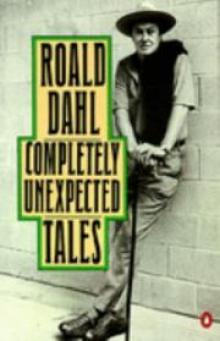 Completely Unexpected Tales: Tales of the Unexpected. More Tales of the Unexpected
Completely Unexpected Tales: Tales of the Unexpected. More Tales of the Unexpected The Wonderful Story of Henry Sugar and Six More
The Wonderful Story of Henry Sugar and Six More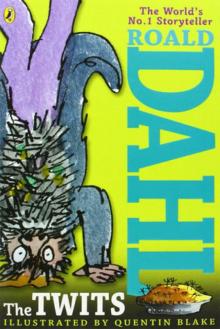 The Twits
The Twits The BFG
The BFG Danny the Champion of the World
Danny the Champion of the World The Witches
The Witches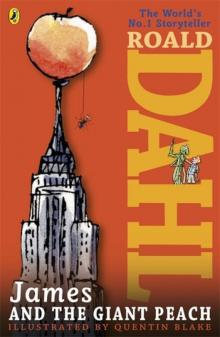 James and the Giant Peach
James and the Giant Peach Charlie and the Great Glass Elevator
Charlie and the Great Glass Elevator Skin and Other Stories
Skin and Other Stories Kiss Kiss
Kiss Kiss Switch Bitch
Switch Bitch The Giraffe and the Pelly and Me
The Giraffe and the Pelly and Me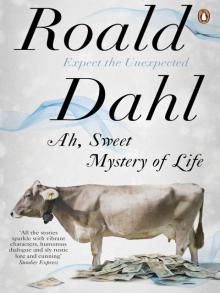 Ah, Sweet Mystery of Life
Ah, Sweet Mystery of Life Fear
Fear The Great Automatic Grammatizator and Other Stories
The Great Automatic Grammatizator and Other Stories Someone Like You
Someone Like You Charlie and the Great Glass Elevator c-2
Charlie and the Great Glass Elevator c-2 More About Boy
More About Boy Tales of the Unexpected
Tales of the Unexpected The Umbrella Man and Other Stories
The Umbrella Man and Other Stories Dirty Beasts
Dirty Beasts Roald Dahl's Mischief and Mayhem
Roald Dahl's Mischief and Mayhem The Collected Short Stories of Roald Dahl, Volume 1
The Collected Short Stories of Roald Dahl, Volume 1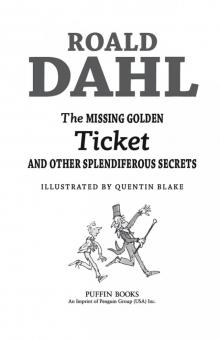 The Missing Golden Ticket and Other Splendiferous Secrets
The Missing Golden Ticket and Other Splendiferous Secrets Billy and the Minpins
Billy and the Minpins Over to You
Over to You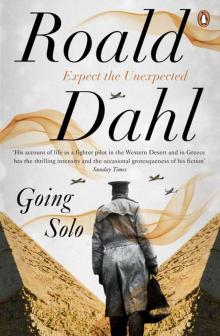 Going Solo
Going Solo Deception
Deception War
War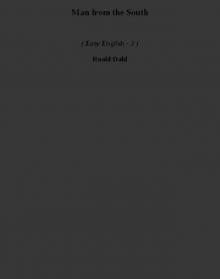 Man from the South ee-3
Man from the South ee-3 More Tales of the Unexpected
More Tales of the Unexpected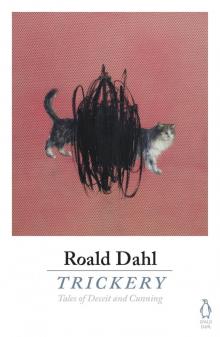 Trickery
Trickery Rhyme Stew
Rhyme Stew Charlie and the Chocolate Factory (Puffin Modern Classics relaunch)
Charlie and the Chocolate Factory (Puffin Modern Classics relaunch)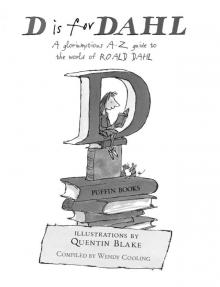 D is for Dahl
D is for Dahl Roald Dahl Whoppsy-Whiffling Joke Book
Roald Dahl Whoppsy-Whiffling Joke Book Spotty Powder and other Splendiferous Secrets
Spotty Powder and other Splendiferous Secrets Charlie and the Chocolate Factory c-1
Charlie and the Chocolate Factory c-1 Boy
Boy Completely Unexpected Tales
Completely Unexpected Tales Madness
Madness Innocence
Innocence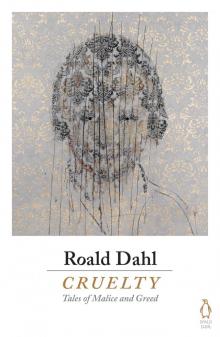 Cruelty
Cruelty George's Marvellous Medicine
George's Marvellous Medicine